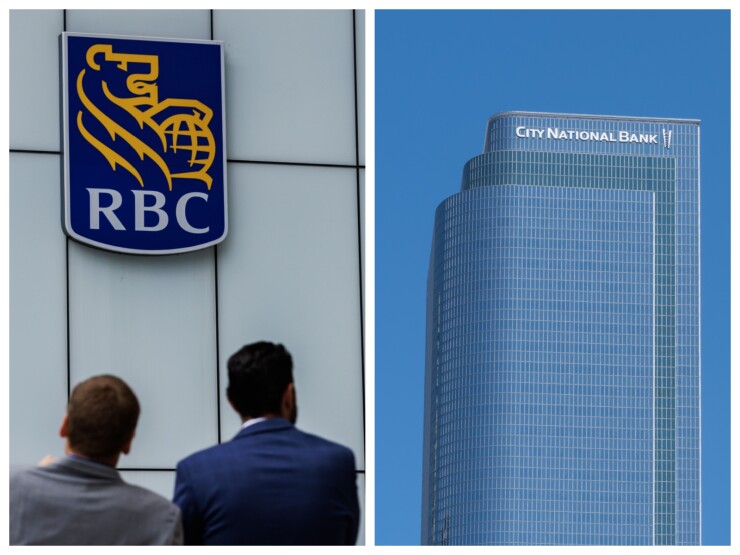
As Royal Bank of Canada tries to mend the damage caused by its last major U.S. acquisition, the Toronto-based company isn't looking to buy another big bank on this side of the border.
Chief Executive Dave McKay pledged caution Wednesday about possible future deals for U.S. banks, even though the Canadian company is building capital, and McKay sounded open to using at least some of that capital in the M&A market.
"I would say it's a very high bar to clear," McKay said in response to a question about the potential for large U.S. deals. "So you need a stable market and a stable set of rules to invest in, and we don't have that yet in the U.S."
RBC is trying to turn around its City National Bank unit, which it acquired nine years ago, following a dreadful stretch for the Los Angeles-based franchise.
City National was hurt not only by two issues that contributed to the demise of two other West Coast banks in 2023 — higher deposit costs and large unrealized losses on securities, both of which stemmed from rising interest rates — but also by a pair of consent orders with U.S. authorities.
After recording $285 million of losses over a six-month period last year, City National reported $52 million of net income in the quarter that ended July 31. The company said the results included a $38 million after-tax charge that relates to steps City National has taken to simplify its business.
City National also reported net interest income of $661 million, up 12% from the same period a year ago as a result of wider loan spreads. Its net interest margin was 2.98%, up 49 basis points from the third quarter of last year. Deposits were flat on a year-over-year basis, and loans decreased by 4%.
RBC executives were largely upbeat about City National's credit outlook, saying accelerated expectations for interest rate cuts have had a positive impact on projected future losses, though expectations for U.S. unemployment and gross domestic product have weakened.
"I think, overall, the performance this year has been a bit better than we expected," RBC Chief Risk Officer Graeme Hepworth said. ""I think coming out of last year with the regional bank issues, it was a concern there. And the client portfolio there has been more resilient than expected."
Still, there are signs that City National, which brought on a new CEO and a new executive chair late last year, has lots of work ahead. In May,
During the call with analysts on Wednesday, RBC interim Chief Financial Officer Katherine Gibson noted that City National has been an asset-sensitive business, which suggests that its net interest income will decline when interest rates fall.
"And in connection with that, we have been putting on forward hedges to protect us in the down rate environment," Gibson said.
City National had $92 billion of assets at the end of April, or about 7% of RBC's total assets. Other large Canadian banks have made bigger splashes with U.S. acquisitions.
Last year, BMO Financial Group extended its U.S. franchise by buying San Francisco-based Bank of the West in a deal that the two companies
TD Financial Group has used acquisitions to build a large retail banking franchise along the Eastern Seaboard, though its deal for Tennessee-based First Horizon got short-circuited last year, reportedly because of concerns about TD's efforts to combat money laundering.
During the call to discuss RBC's earnings, one analyst expressed skepticism about the wisdom of Canadian banks looking for growth south of the border.
"Canadian investors are probably too polite to say it, but they've kind of lost patience with large U.S. deals that do nothing but destroy value," said Mario Mendonca, an analyst with TD Securities.
"And I'm not suggesting that City National was one of those," he said, explaining that the City National purchase deal was small enough in the context of RBC's balance sheet that the damage was limited. "But clearly, the U.S. deals in the last little while have not been good for Canadian shareholders."
McKay responded by noting that the U.S. is an "intensely competitive" market, saying banks have been "quite unsuccessful" there.
He said there could be "tuck-in opportunities" but indicated larger deals in the U.S. are unlikely. "I can't say never, but the bar is incredibly high, and we don't see anything on the horizon," McKay said.
As for the reasons that the City National acquisition soured, McKay put at least some of the blame on what he characterized as a changing regulatory landscape in the U.S.
City National entered into
McKay described the 2015 acquisition of City National as a "low financial risk, higher operational risk strategy."
He added: "The operational risk has been challenging, but we're getting a handle on it."






